Another Timbre TimHarrisonbre
Interview with Eventless Plot
Who are Eventless Plot - how did you meet? how long have you been collaborating? and do you work separately from the group in other contexts?
Eventless Plot is Vasilis Liolios, Yiannis Tsirikoglou and Aris Giatas. We met as students in Thessaloniki back in 2000. Eventless Plot formed around that time and has this unique quality of evolving and maturing along with us three. It is not just a musical collaboration; it’s a stable reference point for us, a canvas on which to put our experiments, dreams, fears and new ideas, sound-related or not. Yiannis moved to the Hague in 2009 to study electronic music at the Institute of Sonology, and Vasilis and Aris still live in Thessaloniki, where they are actively involved in the city's music scene, hosting events and participating in various projects. Along the way we have met and collaborated with many other international and Greek musicians, each separately and also as a group. The way Eventless Plot functions, its geography, context and people, is not strictly defined and that is what makes it exciting. We might make pieces with 'remote' improvisations, collages with forgotten sounds from different collaborations, or we may find musicians to play specialised parts, or meet and create music in our living rooms, or go to a professional studio.
Tell me about the first piece on the CD - Cosmographia. How did it come about and what does the title refer to?
In several of our compositions, musicians, while following some leading lines, are free to add personal touches in their sections. That's why in some cases we like to use the term semi-compositions. However, Cosmographia, a 4 – part piece, is an exception as it is composed with a strict structure. Different tunings and extended techniques are used to produce specific patterns in each part. Some of the musicians keep a stable pace while others have freedom to create unique harmonic combinations. The main idea of the piece came up in 2018, when we discussed and established the basic structure for each part, and we decided that the piece would be comprised of 4 parts that will be connected somehow with common melodic slow shifting patterns and acoustic textures. The challenge with Cosmographia was to achieve a smooth, imperceptible transition among the parts in order to understand it as a unique piece in the end.
The title refers to a painting by Jean Phillipe Arthur Dubuffet, “Cosmographie” from the portfolio ‘The Taker of Imprints’ (Le Preneur d'empreintes) from Phenomena (Les Phénomènes). At a time when Eventless Plot had a live performance in den Haag, we had the chance to visit the contemporary museum of Amsterdam, where an exhibition-retrospective dedicated to Dubuffet was being presented. This painting triggered our interest and inspired us to use a similar title for our composition.
And what about ‘Parallel Words’? Why that title and how does that piece work?
The title reflects the basic idea of the composition. There is a contradiction between the sense of calmness that the piano and flute give, and the tension that the cello and electronics gradually build, like two parallel words. The piece was composed mainly on the piano, and at first we had no idea what the rest of the instrumentation would be. We tried a lot of combinations of instruments in order to best achieve this sense of contradiction. Sometimes the instruments sound as if they are unconnected, as if they have an autonomous role in the piece, and sometimes they meet each other tonally and become one, creating compact structures.
And finally what can you tell us about ‘Conversion’?
This composition explores the sound sustains that occur when different percussive surfaces are struck. Contact microphones are placed on the surfaces and the tones are generated from singing bowls, crotales, cymbals and sound plates. After the surfaces are struck, the tones and harmonies are isolated from the continuous vibration with the help of a mixer in order to control the volumes, and they interact with bowed cymbals and viola. ‘Conversion’ was previously released on a small-run cassette which sold out quickly, and it remains one of our favorite pieces. We have always enjoyed the tones and sustained sounds that are produced after you strike percussion instruments. The physical vibration and the fading out of the sound is amazing, and this is certainly an area that we want to explore further in our compositions.
My impression is that a lot of Eventless Plot’s earlier releases seemed to use more electronics and less conventional instruments than on the new album. Is this the case, and if so, has there been a shift in your group’s music?
We have always used acoustic instruments in combination with electronics. We like to treat sound as one, and we enjoy discovering the in-between complexities of acoustic or electronic mediums, using the qualities of the one on the other, and exaggerating or mutating them. But recently we have found it very challenging to reduce the layers of our music, and have worked on composing with acoustic instruments and have been more focused on the larger form. It feels a bit like a process of growing up, and we have certainly been inspired by composers who allow you to enjoy the sound in itself, and who appreciate the meaning of a change.
I guess that the classical world at least is still weighted towards rather dated notions of creativity coming from individual inspiration rather than collective endeavour. Do you think that Eventless Plot are less likely to receive the attention you are due because you compose collectively?
We hope that attention comes with good music. ‘Collective composing’ sounds rather strict for what we do anyway. We use a variety of methods for creating our music, which lead to new paths, surprises, techniques and inspiration. Sometimes we like to insert a bit of chaos into the process, which is how new things can be born, rather than relying on an individual's know-how.
You live in Thessaloniki. What is the music scene there like? I imagine that the music scene in Athens is bigger, so how easy is it to survive away from that?
These days being an experimental musician seems more and more difficult. Thessaloniki is no exception and, unfortunately, we cannot overlook the fact that in the past decade there has been an intense decline of the cultural scene in the city. The financial crisis of 2008 was catalytic, with strong negative effects and bringing significant changes in Thessaloniki. The rise of unemployment and the decrease of opportunities in the cultural sector forced a mass migration of artists and young people generally to other European metropolitan centres, leaving the local cultural scene poorer. Moreover, culture in general is not very high on the agenda of the conservative local authorities, and unfortunately the situation is not getting better, especially now with covid-19.
Talking specifically about Thessaloniki, the experimental music scene is quite small. We are not even sure if it’s appropriate to call it a ‘’scene’’. Maybe it’s more accurate to say that there are small but significant groups of people working on remarkable projects and presenting them in small venues, and this is something really worthy of support. We hope that over time the audience will become broader and more supportive to experimental artists and labels. But despite all the difficulties, we remain optimistic and look into the future with a positive eye.
Comparing Thessaloniki, with 1 million inhabitants, with Athens, which has 6 million citizens, it’s obvious that Athens will have a bigger, livelier scene. The audience is larger and of course there are more venues, festivals and opportunities than in the North of Greece. But this is of course positive for us too, as we have constant contact with the artists in Athens. There is a lot of mutual respect, and we often invite and get invited to play, and generally we try to support each other.
Also, having Yiannis based in the Netherlands has made it easier for Eventless Plot to organise live performances abroad, something we enjoy very much. These provide great opportunities for us to find new sources of inspiration, and to meet new artists and of course new places.
at163 Eventless Plot - ‘Parallel Words’
Three chamber works jointly composed by a trio from Thessaloniki, Greece
1 - ‘Cosmographia’ (2018) 18:42
Vasilis Liolios psaltery, Stefanos Papadimitiou viola, Yiorgos Petropoulos viola,
Dimitris Stefanou viola & violin, Margarita Kapagiannidou clarinet, Yiannis Tsirikoglou Max/MSP
2 - ‘Parallel Words’ (2019) 19:37
Vasilis Liolios electronics, Aris Giatas piano, Eva Matsigou flute, Jan Willem Troost cello,
Stefanos Papadimitiou viola, Yiannis Tsirikoglou Max/MSP
3 - ‘Conversion’ (2019) 12:32
Vasilis Liolios percussion & contact mics, Aris Giatas percussion & contact mics,
Yiannis Tsirikoglou percussion & contact mics, Stefanos Papadimitriou viola
Youtube extract (Cosmographia)
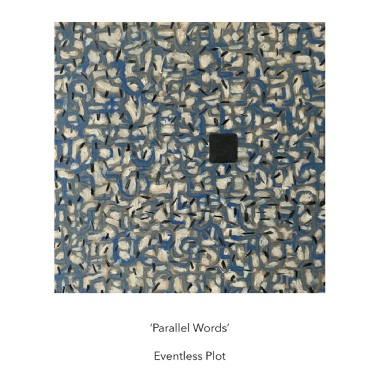
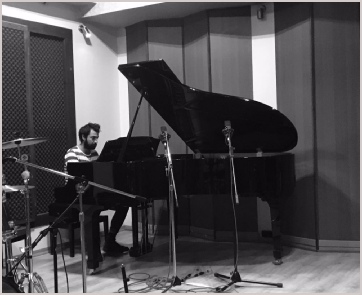
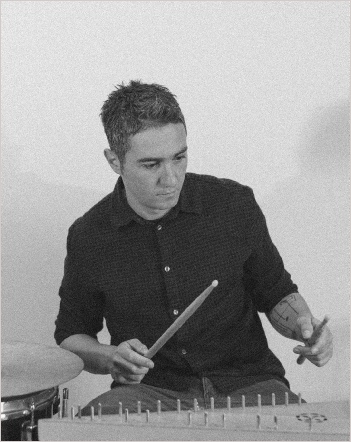
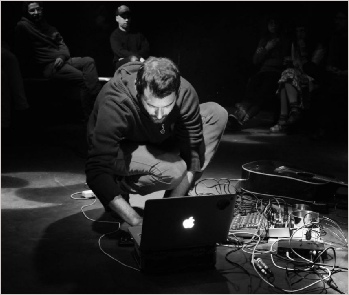
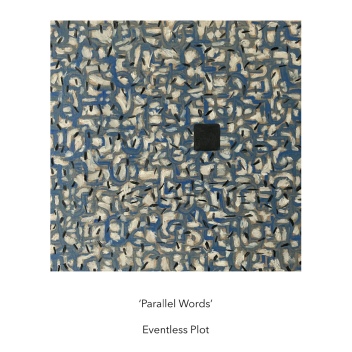
Yiannis Tsirikoglu
Aris Giatas
Vasilis Liolios
Cover painting by Anton Lukoszevieze